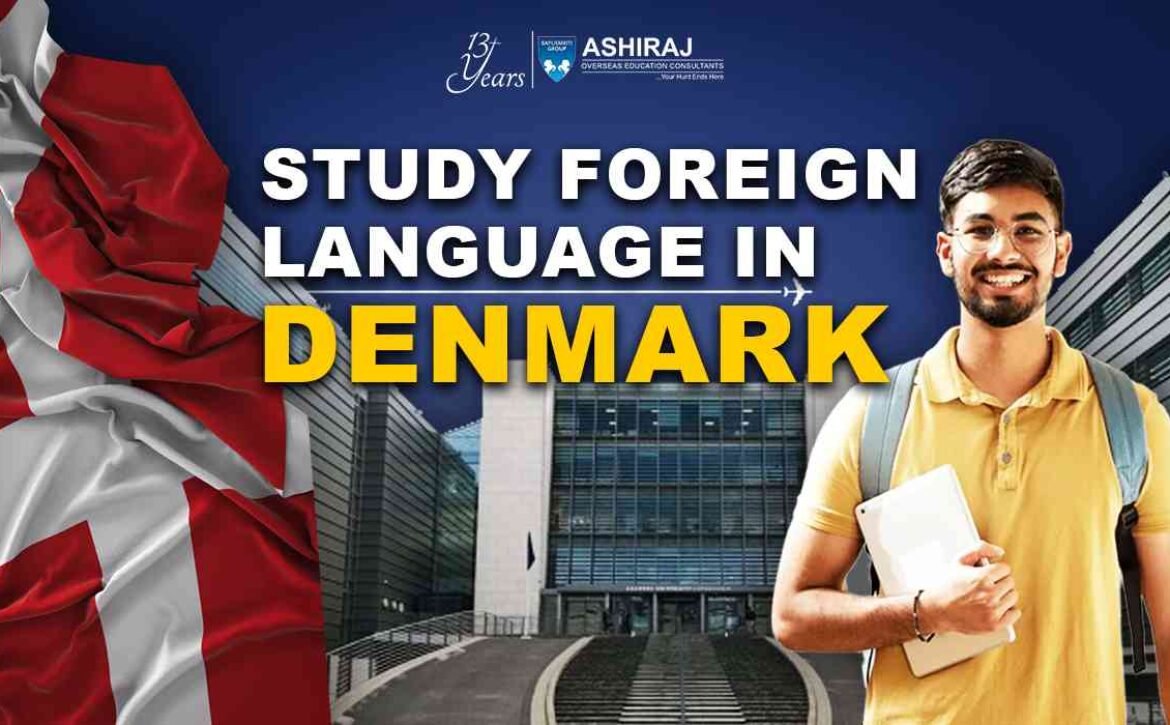
Foreign Language in Denmark
Foreign language learning holds significant importance in Denmark, reflecting its commitment to global communication and cultural exchange. In Denmark, the emphasis on foreign language education underscores the nation’s cosmopolitan outlook and its recognition of the interconnectedness of the modern world. Danish citizens recognize the value of learning languages beyond their native tongue, aligning with Denmark’s reputation as a progressive and internationally engaged society.
Foreign language education in Denmark encompasses a wide array of languages, reflecting the country’s openness to diverse cultures and its recognition of the importance of linguistic diversity in a globalized world. Whether through formal education in schools or informal language learning opportunities, Denmark encourages its citizens to engage with languages beyond their own, fostering a deeper understanding of different cultures and facilitating international cooperation and exchange. The promotion of foreign language learning in Denmark reflects the nation’s commitment to nurturing global citizens who are equipped to thrive in an interconnected world.
Why Study Foreign Language in Denmark?
- Global Perspective: Denmark’s emphasis on foreign language learning reflects its commitment to global engagement and cultural exchange.
- International Career Opportunities: Proficiency in foreign languages enhances job prospects, particularly in Denmark’s globalized economy.
- Cultural Enrichment: Learning a foreign language exposes individuals to diverse cultures, broadening their horizons and fostering empathy and understanding.
- Educational Excellence: Denmark’s education system prioritizes language learning, offering high-quality programs and resources for learners.
- Enhanced Communication Skills: Mastering a foreign language improves communication abilities, facilitating connections with people from around the world.
- Travel and Exploration: Knowing a foreign language enhances travel experiences, allowing individuals to engage more deeply with local cultures and communities.
- Intellectual Stimulation: Language learning stimulates cognitive processes, improving memory, problem-solving skills, and overall mental agility.
- Professional Advancement: In Denmark’s international workplaces, multilingualism is highly valued, offering opportunities for career advancement and professional growth.
- Personal Development: Learning a foreign language is a fulfilling personal accomplishment, boosting confidence and expanding personal and professional networks.
- Contributing to a Global Society: Proficiency in foreign languages equips individuals to contribute positively to a globalized society, promoting cross-cultural understanding and collaboration.
Studying foreign languages in Denmark offers a gateway to a world of opportunities, enriching both personal and professional lives while contributing to Denmark’s global engagement and cultural diversity.
Top Universities to Study Foreign Language in Denmark
University | QS World University Ranking 2023 | Type of University | Average Annual Fees | Programs Offered |
University of Copenhagen | 45 | Public | $0 (EU/EEA) | Bachelor’s, Master’s, PhD in Languages |
Aarhus University | 78 | Public | $8,000 – $12,000 | Bachelor’s, Master’s in Foreign Languages |
Technical University of Denmark | 135 | Public | $0 (EU/EEA) | Bachelor’s, Master’s in Linguistics |
Copenhagen Business School | 155 | Private | $14,000 – $18,000 | Bachelor’s, Master’s in Business Languages |
Aalborg University | 201-250 | Public | $0 (EU/EEA) | Bachelor’s, Master’s in International Communication |
Denmark boasts top-tier universities renowned for their excellence in foreign language education. These institutions offer diverse programs catering to students’ linguistic interests and career aspirations. With the Foreign Language in DENMARK keyword in mind, here’s a comprehensive list of the top universities in Denmark for foreign language studies, along with their QS World University Rankings 2023, university type, average annual fees, and programs offered.
- University of Copenhagen: A public institution ranked 45th globally, offering a wide array of language programs at no cost for EU/EEA students.
- Aarhus University: Another public university ranked 78th globally, offering Bachelor’s and Master’s programs in foreign languages with moderate annual fees.
- Technical University of Denmark: Ranked 135th globally, this public university offers linguistics programs with no tuition fees for EU/EEA students.
- Copenhagen Business School: A private institution ranked 155th globally, offering business language programs with higher annual fees.
- Aalborg University: Ranked 201-250 globally, this public university offers international communication programs with no tuition fees for EU/EEA students. These institutions represent Denmark’s commitment to providing high-quality education in foreign languages, preparing students for global opportunities and cultural exchange.
Course Curriculum for Foreign Language in Denmark
- Language Proficiency Levels: Danish language courses in Denmark are structured according to the Common European Framework of Reference for Languages (CEFR), covering levels from A1 (beginner) to C2 (proficient).
- Core Language Skills: The curriculum emphasizes the development of four core language skills: speaking, listening, reading, and writing, fostering comprehensive language proficiency.
- Cultural Context: Courses integrate cultural components, providing insights into Danish culture, society, and traditions, enriching students’ understanding of the language’s context.
- Interactive Learning: The curriculum incorporates interactive learning methods, including group discussions, role-plays, and multimedia resources, enhancing engagement and practical language application.
- Specialized Tracks: Students may choose specialized tracks focusing on specific language aspects, such as business communication, academic writing, or cultural studies, tailored to their interests and career goals.
- Language Technology: Integration of language technology tools enhances learning experiences, enabling students to explore language resources, practice pronunciation, and engage in online language communities.
- Practical Experience: Many programs offer opportunities for practical language usage through internships, language exchanges, and study abroad programs, promoting real-world language application and cultural immersion.
The course curriculum of foreign language studies in Denmark reflects a comprehensive approach to language acquisition, encompassing linguistic proficiency, cultural understanding, and practical skills. With a focus on interactive learning and specialized tracks, Denmark’s language programs prepare students to excel in a globalized world, embodying the essence of Foreign Language in DENMARK.
Eligibility Criteria & Admission Requirements for MS in Foreign Language in Denmark
- Language Proficiency Tests: Applicants are required to submit either IELTS or TOEFL scores as proof of English proficiency. The minimum IELTS score accepted is 6.5, and for TOEFL, a score of 90 or above is typically required.
- Standardized Tests for Advanced Degrees: For advanced language programs or related fields, applicants may need to provide GRE or GMAT scores. A minimum GRE score of 310 or a GMAT score of 650 is often required.
- Educational Qualifications: Applicants must hold a relevant bachelor’s degree with a strong emphasis on language studies or a related field, demonstrating a solid academic foundation in language and communication.
- Work Experience (if applicable): Some programs may require or consider work experience, particularly for advanced degrees or specialized tracks. Relevant professional experience in language-related fields is advantageous.
- Passport & Student Visa: A valid passport and a student visa are essential for international students. Ensure that your passport is valid for the entire duration of your study period.
- Academic Certificates: Submit official academic transcripts and certificates from previous educational institutions, showcasing your academic achievements and qualifications.
Score Requirements:
Test | Minimum Score |
IELTS | 6.5 |
TOEFL | 90 |
GRE | 310 |
GMAT | 650 |
The eligibility criteria for foreign language programs in Denmark encompass language proficiency, academic qualifications, and additional factors such as standardized test scores and work experience. Aspiring students should ensure they meet these requirements and provide necessary documentation, embodying the essence of Foreign Language in DENMARK.
Documents Required for Studying Foreign Language in Denmark
- Passport: A valid passport with a minimum validity period covering the entire duration of the intended stay in Denmark.
- Two Letters of Recommendation (LOR): LORs from academic or professional referees attesting to the applicant’s abilities and character.
- Statement of Purpose (SOP): A well-written SOP outlining the applicant’s academic background, career goals, and reasons for choosing Denmark for language studies.
- Curriculum Vitae (CV): A comprehensive CV detailing the applicant’s educational qualifications, work experience, achievements, and extracurricular activities.
- Official High School Transcripts: Transcripts reflecting the applicant’s academic performance during high school or equivalent education.
- Educational Certificates: Official certificates confirming the completion of high school or any other relevant educational qualifications.
- Work Experience Certificate (if applicable): A certificate verifying any relevant work experience, particularly in language-related fields.
- Proof of Financial Resources: Documentation demonstrating the applicant’s ability to cover tuition fees, living expenses, and other costs during their stay in Denmark.
Ensuring the submission of these documents is crucial for a successful application to a foreign language program in Denmark. Each document plays a significant role in evaluating the applicant’s suitability for the program, aligning with the standards of Foreign Language in DENMARK.
Admission Process for Foreign Language in Denmark
- Research Programs: Begin by researching foreign language programs offered by universities in Denmark, considering factors such as curriculum, faculty expertise, and language proficiency requirements.
- Check Eligibility: Ensure that you meet the eligibility criteria, including language proficiency requirements, educational qualifications, and any additional prerequisites.
- Prepare Documents: Gather necessary documents, including academic transcripts, language test scores (IELTS/TOEFL), letters of recommendation, statement of purpose, CV, and proof of financial resources.
- Submit Application: Complete the online application form provided by the university, ensuring accuracy and completeness of all information provided.
- Pay Application Fee: Pay the required application fee as per the university’s guidelines, usually through online payment methods.
- Wait for Response: Wait for the university to review your application. This process may take several weeks, so be patient.
- Interview (if required): Some programs may require an interview as part of the admission process. Prepare adequately if you are invited for an interview.
- Receive Admission Decision: Once the university has reviewed your application, you will receive an admission decision via email or postal mail.
- Acceptance and Enrollment: If accepted, follow the instructions provided by the university to accept the offer and complete the enrollment process.
- Visa Application: Apply for a student visa through the Danish consulate or embassy in your home country, providing necessary documents and fulfilling visa requirements.
Following these steps meticulously ensures a smooth admission process to foreign language programs in Denmark, aligning with the standards of Foreign Language in DENMARK.
“Education is the most powerful weapon which you can use to change the world.”
Nelson Mandela
Cost of Foreign Language Course in Denmark
- Tuition Fees: Danish universities often offer tuition-free education for students from the European Union (EU) and European Economic Area (EEA) countries, including language programs.
- Non-EU/EEA Students: Non-EU/EEA students may incur tuition fees, which vary depending on the university and program. Average annual tuition fees for language programs range from $8,000 to USD 18,000.
- Living Expenses: Living costs in Denmark can be relatively high, particularly in major cities like Copenhagen and Aarhus. Monthly expenses for accommodation, food, transportation, and other essentials can amount to approximately $800 to USD 1,200.
- Health Insurance: International students are required to have health insurance coverage during their stay in Denmark. The cost of health insurance varies depending on the provider and coverage options.
- Additional Expenses: Miscellaneous expenses such as books, study materials, student association fees, and leisure activities should also be considered when budgeting for studying in Denmark.
- Scholarships and Financial Aid: Some universities and external organizations offer scholarships and financial aid to international students, helping alleviate the financial burden of studying abroad.
Understanding the cost of studying foreign languages in Denmark is essential for prospective students planning their education abroad, ensuring financial preparedness and aligning with the standards of Foreign Language in DENMARK.
Scholarships for Foreign Language Courses in Denmark
Scholarship Name | Amount | Application Deadline | Eligibility Criteria |
Danish Government Scholarships for Non-EU/EEA Students | Varies | March 1st (annual) | Non-EU/EEA students pursuing higher education in Denmark |
Erasmus+ Program | Varies | Varies | EU/EEA students participating in exchange programs |
University-specific Scholarships | Varies | Varies | Criteria set by individual universities |
Fulbright Program | Varies | October 8th (annual) | US citizens pursuing graduate studies in Denmark |
Nordic Scholarship Program | Varies | Varies | Students from Nordic countries pursuing education in Denmark |
Scholarships play a vital role in financing foreign language education in Denmark. The table above outlines various scholarship opportunities available to students pursuing language studies in Denmark. These scholarships cover tuition fees, living expenses, and other educational costs, easing the financial burden for international students. It’s crucial to note the application deadlines and eligibility criteria for each scholarship opportunity. By availing themselves of these scholarships, students can pursue their language education in Denmark with financial ease, contributing to the promotion of Foreign Language in DENMARK.
Career Opportunities After Foreign Language in Denmark
Job Profile | Average Salary (per year) | Description |
Language Teacher | $45,000 – $65,000 | Teach foreign languages in schools, language institutes, etc. |
Translator/Interpreter | $50,000 – $70,000 | Translate written documents or interpret spoken language. |
International Relations Specialist | $60,000 – $80,000 | Facilitate communication between Denmark and other countries. |
Tour Guide | $35,000 – $50,000 | Conduct tours in multiple languages, showcasing Danish culture. |
Language Consultant | $55,000 – $75,000 | Provide language expertise to businesses or organizations. |
Learning a foreign language in Denmark opens up diverse career opportunities across various sectors. Language teachers are in demand in educational institutions, while translators and interpreters play crucial roles in bridging linguistic barriers. International relations specialists facilitate diplomacy and cultural exchange, while tour guides showcase Denmark’s rich heritage to visitors. Language consultants provide valuable expertise to businesses expanding into global markets. With competitive salaries and rewarding job prospects, pursuing a career in foreign languages aligns with Denmark’s commitment to fostering linguistic diversity and cultural exchange, embodying the essence of Foreign Language in DENMARK.
Frequently Asked Questions About Foreign Language in Denmark
Yes, many language programs in Denmark are offered in English, making them accessible to international students.
The requirements vary, but common tests like IELTS or TOEFL are often accepted. Minimum scores depend on the university and program.
EU/EEA students often enjoy tuition-free education. Non-EU/EEA students may have tuition fees, typically ranging from $8,000 to USD 18,000 annually.
Yes, there are scholarships offered by the Danish government, universities, and international programs like Erasmus+ and Fulbright.
Yes, international students are allowed to work part-time during their studies. However, there are restrictions on the number of hours.
Bachelor’s programs usually last three years, while master’s programs typically last two years.
Career options include language teaching, translation, international relations, tourism, and language consultancy.
Learning Danish is not always mandatory, but it can enhance the overall experience and provide additional opportunities.
Apply for a student visa through the Danish consulate or embassy in your home country, providing necessary documents and fulfilling visa requirements.
Yes, after completing the program, you can apply for an extension, work permit, or pursue advanced studies in Denmark.




